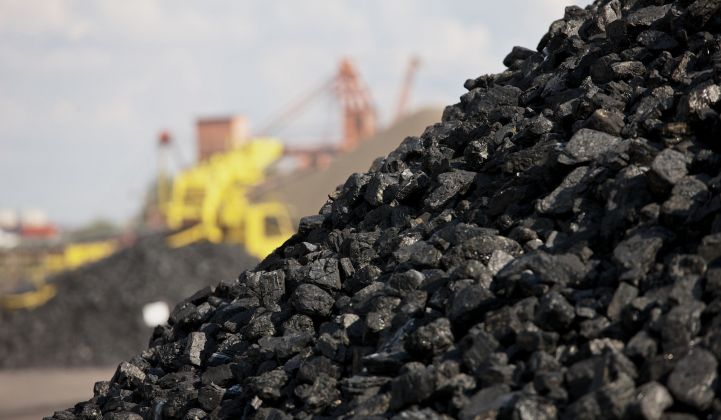This week, BlackRock, the world’s largest investor in coal, added its name to a list of 117 globally significant financial institutions with a coal-exclusion policy. The move sends a loud signal to markets about the risk of the world’s dirtiest fossil fuel. But it’s the first, not the last step toward limiting BlackRock's coal exposure.
With $17 billion invested in coal, BlackRock was a glaring omission from the growing consensus in the financial community that coal is simply too toxic to touch. Indeed, a coal policy has become the minimum step toward credibility that a financial institution serious about addressing climate change must make. With other leading U.S. financial actors moving and pressure to act growing, BlackRock has responded by announcing its coal policy.
The announcement defines a coal company as one earning more than 25 percent of its revenue from thermal coal production; it restricts the policy to BlackRock's active portfolio, which is only about one-quarter of its total assets. While not limiting the totality of its exposure, it is nonetheless a positive first step toward reducing the company's financial and reputational risk.
But as always, the devil is in the details.
First, and most importantly, it is unclear if this includes both coal mining companies and coal-heavy utilities. If it applies only to miners, it would not fully reduce the risk that coal poses to BlackRock's clients given the growing risks that coal-heavy utilities face in a rapidly changing world.
Indeed, best-in-class coal policies from global leaders like Axa and Credit Agricole not only cover mining companies and utilities but also give firm exit dates and ratchet down to zero their overall exposure, in keeping with the latest climate science.
The reason those details matter is that early reports suggest some of the largest coal mining companies in the world could slip through the cracks. In order to solve this problem, BlackRock would do well to align its policy and the companies it excludes with the methodology of the Global Coal Exit list, to which more than $10 trillion in assets under management currently adhere.
These details will not only help keep further pressure to act at bay but also deliver better returns. While it is morally improper to invest in fossil fuels during a climate crisis, it is also a bad financial investment, as the U.S. coal index lost half its value last year at the same time the overall market continued its historic growth.
Still, while BlackRock will need to clarify and strengthen this policy over time, with $1.8 trillion in its active portfolio alone, this is the largest coal-exclusion policy ever put in place. If expanded over time to its entire passive investment portfolio, it would cover nearly $7 trillion in assets.
To put that in perspective, the entire divestment movement counts $12 trillion in assets divested. Put mildly, this is a big deal — if it is done right.
That’s important, because BlackRock has come under intense scrutiny for its failure to act on climate change. That pressure seems to have crystallized, convincing the company that its future should not be tied to the fossil fuel industry.
Instead it can, and has, cut ties with those responsible for driving the climate crisis — a decision every company in the world must now make. Because in 2020, with an entire continent ablaze, words are no longer enough.
Ultimately, money talks, and BlackRock’s new coal policy is speaking volumes to the financial community.
***
Jigar Shah is co-founder and president of Generate Capital. Justin Guay is global climate strategy director at the Sunrise Project.




